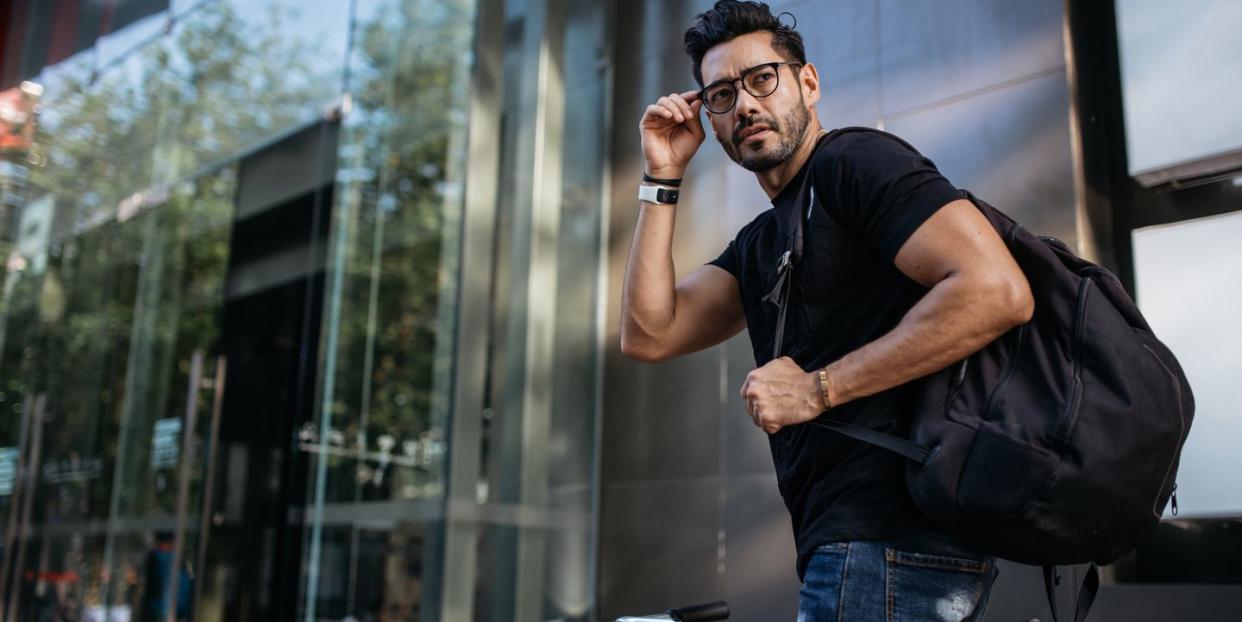4 Expert Tips for Keeping Your Vision Sharp On and Off the Bike

There’s no messing around when it comes to your eyesight-especially not on the bike. That’s why eyewear is such an important part of essential gear for the sport. No matter where you ride, you always need to be on the lookout for road hazards, dangerous situations, and protect your precious eyes from flying objects. So being able to see clearly and having strong peripheral vision are key components to staying safe.
As we get older though, parts of our body naturally wear down over time-and our eyes are no exception. Eyesight can worsen strictly due to the aging process. “Genetics often give a person the range of what their prescription can be, and environmental and behavioral factors will often dictate where they end up in that range,” explains Justin Bazan, doctor of optometry and owner of Park Slope Eye in New York.
Outside of standard aging, eye-related diseases can also impact your sight. One of the most common: cataracts. This is where the naturally clear lens of the eye, over time-and even more so with sun exposure-becomes yellowed and opaque, which leads to blurry vision and issues with glare, especially from lights at night, explains Bazan.
While worsening eyesight isn’t ideal for anyone, it can be a real issue for us out there on the road and trails. The good news: There are some steps you can take to keep your eye health in check. We asked Bazan to share his top tips for improving your eyesight and preventing your vision from getting worse.
Tips To Improve Your Eyesight
1. See an eye doctor annually for a comprehensive exam.
The best way to improve or prevent vision issues is to be up-to-date on eye doctor appointments so you know where you stand. Early detection is the key to preserving good vision. If you don’t already have an eye doctor, visit thinkaboutyoureyes.com to find one near you. “Often times, changes to our vision are so gradual and/or subtle, we don’t notice them until we are shown just how much our vision can be enhanced with a new prescription and glasses or contacts,” Bazan says. He recommends visiting an eye doctor at least once a year or more if you have a unique situation.
2. Get the correct eyewear.
Shades or clear lenses are a part of most riders’ kits, but those glasses you love could be due for an update. Talk to your eye care provider about what the best types of frames and lenses are for you and your specific needs as a cyclist and in your daily life. These days, there are plenty of lightweight, scratch- and break-resistant options out there you might not even know about. “Having the right lenses can often greatly improve vision and subsequently performance,” Bazan says. “For example, you may be riding over a long day with varying lighting and would need a photochromic lens that changes tint automatically in response, or you may need a polarized lens that takes the harsh glare off the road.” The pros in your eye doctor’s office or an eyeglass store can help guide you to the right options. Once equipped, you may no longer need to strain your sight during rides, which can make your vision worse over time.
3. Wear sunglasses, especially when riding.
There’s a reason why you see all the pros wearing sunglasses during big events like the Tour. They are an important tool for eye protection. Think of sunglasses with UV protection as SPF for your eyes, which is necessary to prevent damage. “Blocking the powerful UV and blue light will help ensure your eyes stay healthy and our vision stays clear,” Bazan says.
4. Eat for your eyes.
We’ve probably all experienced the eyes-bigger-than-stomach phenomenon that tends to happen after a long ride (you know, when you order the whole left side of the menu but are unable to finish all the food). Well, Bazan recommends eating for your eyes, not with them.
Eating foods chock full of healthy-vision vitamins such as beta-carotene (a type of vitamin A found in orange foods like carrots and sweet potatoes), vitamin C (found in oranges and citrus fruits), vitamin E (found in leafy greens), omega-3 fatty acids (found in salmon and tuna), and zinc (found in eggs) can help protect the health of the cells in your eyes. Pairing that with regular exercise, hydration, and sleep can set you up for longterm healthy vision. “Your eyes are part of the same vascular system as the rest of your body,” explains Bazan. “High blood pressure, and especially diabetes, often leads to severe vision problems.” But a healthy lifestyle that supports your already-active lifestyle is the key to keeping your vision sharp in the long run.
('You Might Also Like',)

